 MyCatBreeds
MyCatBreeds Cornish Rex is originated from United Kingdom but American Polydactyl is originated from United States. Both Cornish Rex and American Polydactyl are having almost same weight. Cornish Rex may live 4 years more than American Polydactyl. Both Cornish Rex and American Polydactyl has same litter size. Both Cornish Rex and American Polydactyl requires Low maintenance.
Cornish Rex is originated from United Kingdom but American Polydactyl is originated from United States. Both Cornish Rex and American Polydactyl are having almost same weight. Cornish Rex may live 4 years more than American Polydactyl. Both Cornish Rex and American Polydactyl has same litter size. Both Cornish Rex and American Polydactyl requires Low maintenance.
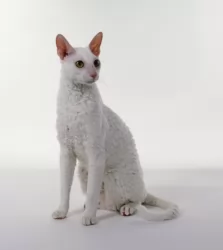 Cornwall is the birthplace of the unusual Cornish Rex cat – a curly-coated cat.
Cornwall is the birthplace of the unusual Cornish Rex cat – a curly-coated cat.
A kitten was born in 1950 and belonged to Nina Ennismore and Winifred Macalister. The other kittens had short hair but this unusual kitten had curly hair, the result of a spontaneous natural mutation.
A successful breeding program was started and it was in 1963 that the American Cat Fanciers Association as well as the and today it is recognized by all cat registries.
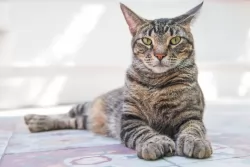 It is believed that this unusual cat came to the United States on ships – kept by sailors who thought of them as a good luck charm and to keep the mice population under control.
It is believed that this unusual cat came to the United States on ships – kept by sailors who thought of them as a good luck charm and to keep the mice population under control.
These unusual cats became popular in the 1800s as ship cats but the cats soon began to be seen in port cities on the Eastern coast of the United States as well as Canada, and their numbers began to increase.
It is also believed these interesting cats were brought specifically to the Boston area.
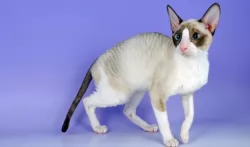 The Cornish Rex is a small to medium-sized cat weighing between 3 to 5kg. It’s a lithe, slender cat with a small, narrow head with big ears and eyes.
The Cornish Rex is a small to medium-sized cat weighing between 3 to 5kg. It’s a lithe, slender cat with a small, narrow head with big ears and eyes.
The cat has long, slender legs with a tail that is also slender and long. The hair is very fine and they are actually prone to hair loss. The coat has fine, short, silky hair. There can be a bit of a curl in the hair, The coat comes in many colors from white, silver, black, red, blue to chocolate and they can have different patterns too as well as bein bi-color.
The eyes can be gold, brown, or green. The torso is long and lean, the cat has a deep chest but strong hips and rear end that allow the Cornish Rex to leap with ease up onto perches.
The Cornish Rex loves his human family and loves spending time with them, whether that means fun and games or sitting in your lap.
He is intelligent and can learn a few tricks and is capable of learning to walk on a leash. He is a confident cat, playful and entertaining. Gentle and loving, he is a talkative cat, wanting to express his opinion about everything.
He will fit easily into different lifestyles, whether you’re single, a family, or in a retirement home, so long as he is receiving lots of attention.
He isn’t as frail as he looks and can get pretty active and social with children and dogs and may even beat the dog to fetching a small ball.
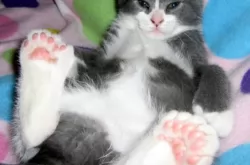 The Polydactyl cat is unusual in that the cat has been born with something odd about it. It has more than the regular number of toes on just one or more of its paws.
The Polydactyl cat is unusual in that the cat has been born with something odd about it. It has more than the regular number of toes on just one or more of its paws.
Normal cats have a sum of 18 toes, with 5 on the front and 4 on the back but with Polydactyl cats you may find as many as 9 digits on their front and back paws.
American Polydactyl cats are medium to large in size with strong, muscular bodies. The cat can weigh up to 6kg. The head is broad, the ears wide-set and pointed and the coat can be any color, pattern and length.
These cats are easy-going, relaxed, and social. They’re hardy too and they’re able to enjoy being outdoors and indoors.
They’re affectionate with their human family and are also playful and energetic. It is prepared to be friendly with dogs and children too, but it is also able to act independently and get on with things. The Polydactyl cat is distinctive but also a very popular cat breed.
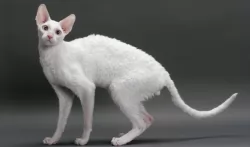 If you’re looking for a cat that can bring laughter and fun into the household, you won’t go wrong with a Cornish Rex as they will amuse and delight.
If you’re looking for a cat that can bring laughter and fun into the household, you won’t go wrong with a Cornish Rex as they will amuse and delight.
He is also a cat that doesn’t require a lot of fuss and bother, although he makes a fuss about the amount of attention he gets.
He doesn’t like being left alone for long, so a good idea is to work from home or to get a companion for him. Other than than, he makes the most splendid feline companion.
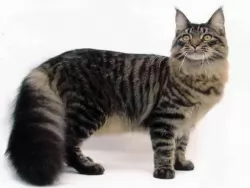 The American Polydactyl cat is such a down-to-earth kind of cat that you can welcome him into your home with ease.
The American Polydactyl cat is such a down-to-earth kind of cat that you can welcome him into your home with ease.
Easy to look after, this lively and interesting cat will fill your home with love and companionship, and just a few extra toe nails to clip!
 The Cornish Rex is a hardy cat with very few health issues. Certainly, because of the very fine hair, you’d have to be aware of sunburn.
The Cornish Rex is a hardy cat with very few health issues. Certainly, because of the very fine hair, you’d have to be aware of sunburn.
Cats can get sunburned and can be at serious risk of getting skin cancer later on. Be sun-smart and apply pet sunscreen.
Be careful of the type of sunscreen you use as your cat will likely want to lick it off. Other issues to look out for are hypertrophic cardiomyopathy. This is a common kind of heart disease in cats where there is a thickening in the wall of the heart.
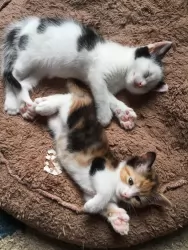 With good care, these cats can live to be between 14 and 16 years of age. You need to be diligent with keeping this cat’s nails trimmed because depending on the placement of the toes, the nails could become a nuisance, growing in the wrong direction and cutting into he cat’s flesh.
With good care, these cats can live to be between 14 and 16 years of age. You need to be diligent with keeping this cat’s nails trimmed because depending on the placement of the toes, the nails could become a nuisance, growing in the wrong direction and cutting into he cat’s flesh.
Keep the nails trimmed as necessary. To avoid possible injury to your pet, your veterinarian can safely trim your cat’s claws.
Always pay attention to your cat's behavior as well as taking note of your cat when you groom him as both are good ways to discover whether anything is amiss with your polydactyl cat.
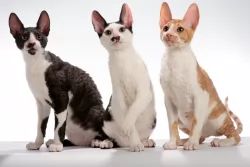 Grooming your Cornish Rex isn’t going to be an issue as the cat has very little hair. Although nothing is set in stone and some Cornish Rex’s have thicker coats, requiring more brushing. Maybe a soft brush once a week will be sufficient for this cat breed.
Grooming your Cornish Rex isn’t going to be an issue as the cat has very little hair. Although nothing is set in stone and some Cornish Rex’s have thicker coats, requiring more brushing. Maybe a soft brush once a week will be sufficient for this cat breed.
A good idea is to take a cloth of warm water and to gently wipe your cat so that he is free of dust.
Supply a litter box and make sure that you remove his droppings every single day.
Have your pet neutered or spayed if you don’t want unwanted kittens. These minor ops have many health benefits for your cat as well.
When you brush your cat, check his entire body out for any abnormalities. Check for new lumps, check inside the ears to make sure they are clean and free of redness which could indicate an infection.
Clip his toenails, make sure his eyes are clear and bright, free of discharge, and check inside his mouth to make sure there aren’t any bad teeth, as this could cause him a lot of discomfort.
 Keep an eye on your cat’s paws as their extra toes can make it that they are at a higher risk of hooking on a carpet or some other material, but this can be managed with regular nail trimming.
Keep an eye on your cat’s paws as their extra toes can make it that they are at a higher risk of hooking on a carpet or some other material, but this can be managed with regular nail trimming.
Provide your cat with all the things he needs to make his life pleasant while in your care. He’ll need feeding and drinking bowls, a nice warm, dry bed, a litter box, stimulating toys, and things such as a scratching post and cat climbing tree.
Cats are meat-eaters, and they need protein from meat for health. Some cooked chicken and beef can be a real treat for your pet. Grains and carbohydrates should only play a very small role in your pet’s diet. Too many grains can lead to malnutrition and obesity as well as problems with your cat's organs.
Always take into account your cat’s age because different life stages mean different energy levels and therefore different nutritional needs.
Take your sick cat to the vet when you see he is not his usual self. Make sure you keep up to date with all his vaccines and anti-parasite treatments.
One of the most important health decisions you’ll make for your Polydactyl cat is to have your pet spayed or neutered. The procedure is common and performed in your vet’s office every day.
It offers lifelong health benefits. It improves your pet’s behavior and keeps them close to home too. Spaying a female cat will prevent uterine infections and breast cancer, and for males, it can prevent testicular cancer.
Best of all, it helps to prevent yet more kittens into a world overrun with stray cats and rescue centers jam-packed with unwanted kittens and cats.